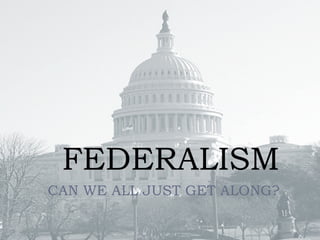
Federalism
- 1. FEDERALISM CAN WE ALL JUST GET ALONG?
- 4. How was this going to be worked out in the government? Look at the Constitution: Turn to page 55 in your book How did this play out? The Supreme Court McCullough v Maryland (1819) Does Congress have the right to set up a bank? Well…Congress can manage money, collect taxes, issue currency—I don’t see the word bank…BUT Using the “necessary and proper clause” in the Constitution he said with limits yes they can
- 5. Second question: Can a state lawfully tax a federal bank? NO—”the power to tax is the power to destroy” The federal government was created by the people to rule over them The only way for this power to be sovereign was for it to be immune from state laws Therefore, the Maryland Law is unconstitutional Another issue Congress passed laws punishing news editors for writing articles that criticized the federal government The states felt they had a write to declare null and void any law that violated the Constitution The laws expired before a court settled the question but it comes up again with John Calhoun
- 6. 10 th Amendment The powers not delegated to the US by the Constitution, nor prohibited to it by the states, are reserved to the States respectfully, or to the people Gibbons v Ogden (1824) Mr. Ogden receives a state licensed monopoly to run a ferry across the Hudson River Mr. Gibbons receives a federal license for river traffic between NJ and NY Mr. Ogden sued saying only his license was valid Marshall said let’s look a the Federal Interstate Commerce Clause (Art I, Sec 8, Clause 3) “Congress has the power to regulate commerce with foreign nations, and among the several states…” Gibbons wins—Power of the Federal government to regulate commerce
- 7. The Elastic Clause (Article I, Section 8) Congress shall have the power "to make all laws which shall be necessary and proper for carrying into execution...powers vested by this Constitution in the government of the United States."
- 8. Dual federalism -the federal government and the state governments are co-equals, each sovereign. In this theory, parts of the Constitution are interpreted very narrowly. Cooperative federalism - the national government is supreme over the states